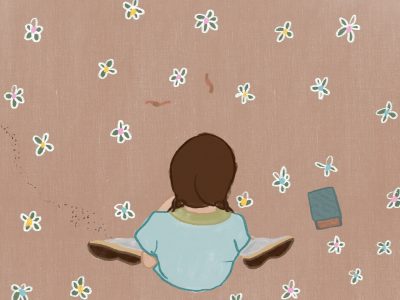I remember spending the summer of 2008 in the Russian countryside with my grandparents. I was seven, stubborn and curious, with big brown eyes and hair tied tightly into two braids that reached my thighs.
That summer was perhaps the only clear memory I have of my grandfather, and even then I only remember a faded portrait of an alcoholic who never quite overcame his addiction: the rawbone frame, empty blue eyes and discolored skin that melted off of his face like ice cream.

When you’re seven, things seem to just happen to you. I had no say in where I went or for how long, nor did I understand or care. All I knew is we were driving into the derevnya — the Russian word for countryside — in the back of my grandfather’s friend’s truck and I was going to ask my grandmother six or seven times how long it would take until we got there.
That’s not so much the case anymore. There doesn’t seem to be as much room in my life for the same sort of stubbornness and spontaneity.
I expected this past weekend would feel a lot more climactic. After all, I’d spent the last couple of nights crying over FaceTime to my boyfriend — bless his patience — about how overwhelmed I’d felt this past week.

Class, work, meetings, sleep — the draining, time-consuming and anxiety-inducing cycle of a college student. I was sure I wasn’t alone in my stress, but it was so easy to trick myself into thinking I was the only one suffocating.
However, in a surprising twist of fate, my Google Calendar was completely empty this weekend. Expecting to make something of my newfound freedom, I found myself sitting emptily at my desk, refreshing the YouTube homepage for the fifth or so time, hoping something in its algorithm would inspire me.
Nothing did, and so I did nothing. My two-day escape from the week ironically made me miss my work.
As adults, we tease children for their fantastical and romantic characterizations of being a grown-up. I vaguely remember being seven, looking up at my future from the bottom of a staircase, making out a version of my 20-year-old self using just a silhouette.
I was going to have kids — lots of them — and a giant house with a pretty husband and a job as a big-time director. None of that came true, of course, but my 20-year-old self looks down at that little girl now from a quarter of the way up the same staircase, fondly.
That little girl sat by the ozera — lake — silently. In the derevnya, the ozera glistened and swayed, the pastel blue sky dulled the sun out with passing clouds and my grandfather tugged at the handle of a fishing pole. I watched ants make mountains of my knees as they journeyed across my body before disappearing into the grass.
We’d stored a dozen or so worms inside an old cigarette box, and when my grandfather wasn’t looking, I pulled it open. My seven-year-old self was quite the humanitarian, so I chose a lucky two at random and placed them on the dirt next to me. In my head, I was setting them free.
They inched away slowly and I egged them on proudly.
Sometimes I wonder how much of that memory is real and how much of it has been distorted by an additional decade of life. But in moments when I’m feeling particularly sad or confused or like nothing is going my way, it seems appropriate to remind myself of the derevnya, the ozera, my grandfather and his cigarette box of worms.
It’s a cruel joke a lot of us play — reminding ourselves of “simpler” times without deadlines and responsibilities, so that we can reminisce about times we will never get back.
Then it starts to feel unfair to capture this idealized version of my younger self. Did she not exist outside of this memory? Did she not also experience sadness, anger and grief? She may have experienced it differently, but that wouldn’t make the pain any less real.
It’s so ironic to mock children for their romanticization of the future while I so desperately tried to make sense of fantastical versions of my past.
I joke so often to my friends about a fast-forward button on life. I tell them how much better I would feel if I could just get past this hard, draining, boring part of life and straight to the good stuff.
I pretend that the good stuff is a destination: a physical, tangible place I will somehow find myself in.
I’m convinced this part is the car ride, the asking my grandmother six or seven times over how long until we get there, the worms squished together in a cigarette box waiting for some seven-year-old to set them free. Life begins, in my current 20-year-old fantasy, at the derevnya, and I have no control over when and how I’ll get there.
But life isn’t a waiting game. I want to be able to look down at my 20-year-old self from the top of the staircase and admire her just as fondly as I do the young girl fishing with her grandfather in the Russian countryside.
To do so, I have to stop spending each day waiting for the next one. With so much time left, what’s the rush?





















































































































